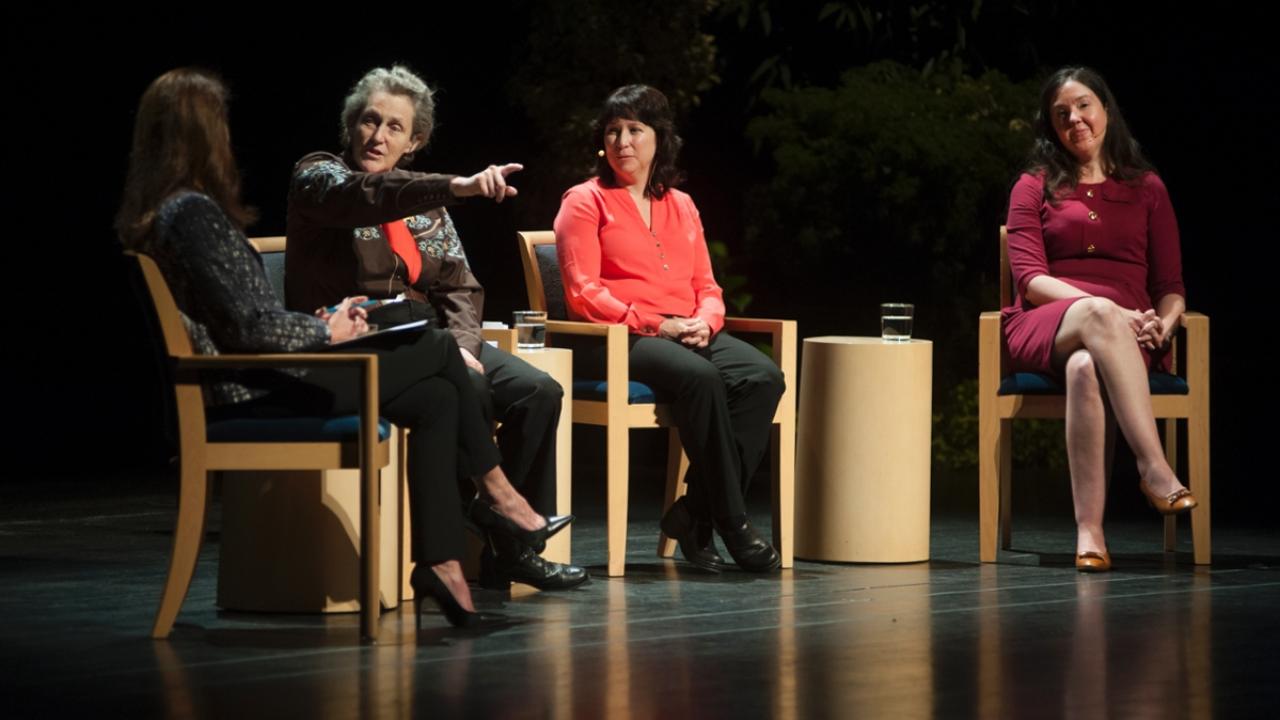The more practical, hands-on classes disappear from public schools, the more adults with autism end up living on government assistance because they have few real-world skills, Temple Grandin told a campus forum last week.
The free forum the afternoon of Feb. 10 drew about 150 people to Jackson Hall at the Mondavi Center for the Performing Arts. That night, in the same hall, Grandin gave the author’s talk in the 2014-15 Campus Community Book Project — which encouraged people to read Grandin’s Thinking in Pictures: My Life with Autism.
She held a similar forum the next day at the UC Davis Health System.
She is no stranger to UC Davis, having spoken here before about her own autism (she has written more than a dozen books and was the subject of an HBO biography), and also having visited as an animal scientist. She is a professor at Colorado State University.
While working in the construction industry, she told the forum audience, she saw many workers who were likely on the autism spectrum but were able to be self-sufficient.
“I want to put an emphasis on what people can do,” Grandin said. “I want to see people get out and be productive and be happy.”
Grandin was part of a panel discussion led by Beth Ruyak, host of Capital Public Radio’s “Insight,” and also including Susan Rivera, a professor of psychology at the UC Davis MIND Institute, and Kristen Loutensock, a Ph.D. candidate at UC Berkeley.
Much more is known about autism than when Grandin had her first brain scan in 1988, but diagnosis is still complicated, the panelists agreed.
“There’s no black-and-white dividing line between the autism spectrum (and typically developing),” Grandin said.
She stressed the importance of spotting signs of autism early, saying therapy to teach basic social skills like taking turns should take place as soon as possible.
Ruyak replied: “I think a lot of what you’re saying would be good parenting for any child.”
Rivera said children who show signs of autism should be pushed to practice interacting with others; to not do so is “tantamount to harm.”
Grandin said parents often ask her for advice when they suspect their children may be on the autism spectrum. Response is difficult, because the condition varies so widely: Autism can present as anything from a social quirkiness to “an overwhelming tidal wave of stimulation” in people with sensory issues.
Grandin herself said she barely spoke until she was 4 and never liked being touched, but learned to work with it. At the end of the forum, she gave Ruyak permission to shake her hand.
Discussion centered on Grandin’s experiences
Society’s understanding of autism has evolved with the scientific community’s, Loutensock said. She studies how disabilities are portrayed in movies and popular culture, and said early depictions had glaring inaccuracies, like Elvis Presley “curing” a girl of autism by singing to her in the 1969 film Change of Habit.
Grandin frequently interjected her own relevant experiences. For example, when the movie Rainman entered the conversation, she added that she met with Dustin Hoffman “to tell him what autism felt like.”
Much of the discussion focused on Grandin’s life. Ruyak asked her for a demonstration of her visual thought process — and threw out the words “vegetable platter,” to which Grandin said she first pictured a tray of food in her dressing room, then theater employees and stagehand jobs she had seen done by many people with autism.
When the forum ended, audience members crowded around Grandin to pose with her in photos.
Matthew Zajic and Danielle Hagood, doctoral students in education, came to the discussion to hear Grandin’s perspective on autism.
“Temple Grandin is very invested in practical changes for people with autism, and invited everyone, no matter what silo you’re in, to be included in that,” Hagood said.
The audience also included Linda Scott, a pregraduate and preprofessional specialist in the Student Academic Success Center, who helped plan the first Campus Community Book Project. It began in 2002-03, in response to the Sept. 11 attacks, as a way to promote campus conversation around a single topic, to have faculty, staff and students engage with people of diverse backgrounds and listen respectfully to all points of view.
Scott said she enjoys the freeform and informal discussions like the one with Grandin. “I loved what happened here,” Scott said. “I have been coming to these ever since (the first one) and telling all my friends about it.”
Among those who heard about the forum from Scott, Davis resident Colette Kitlas, said she found Grandin fascinating.
“She’s done a great job helping the world to understand what it’s like to have autism,” Kitlas said.
Media Resources
Dave Jones, Dateline, 530-752-6556, dljones@ucdavis.edu
